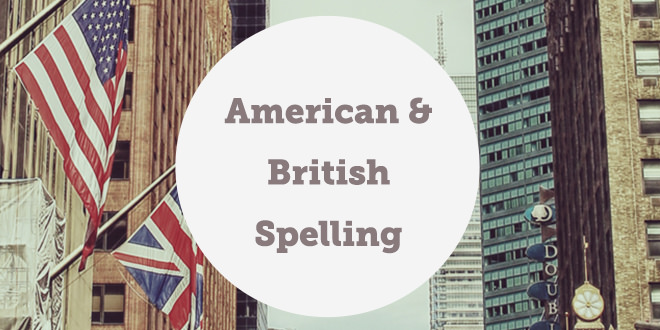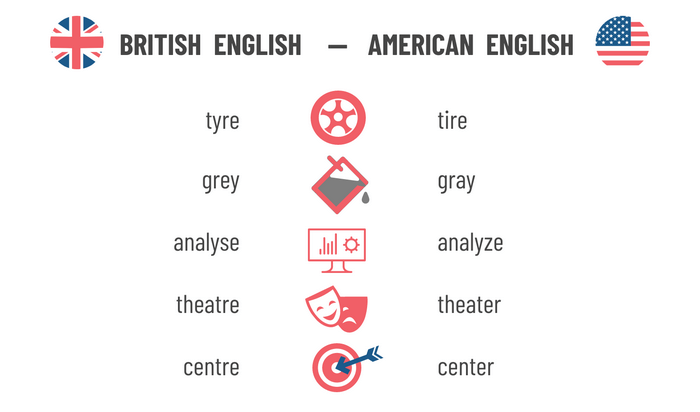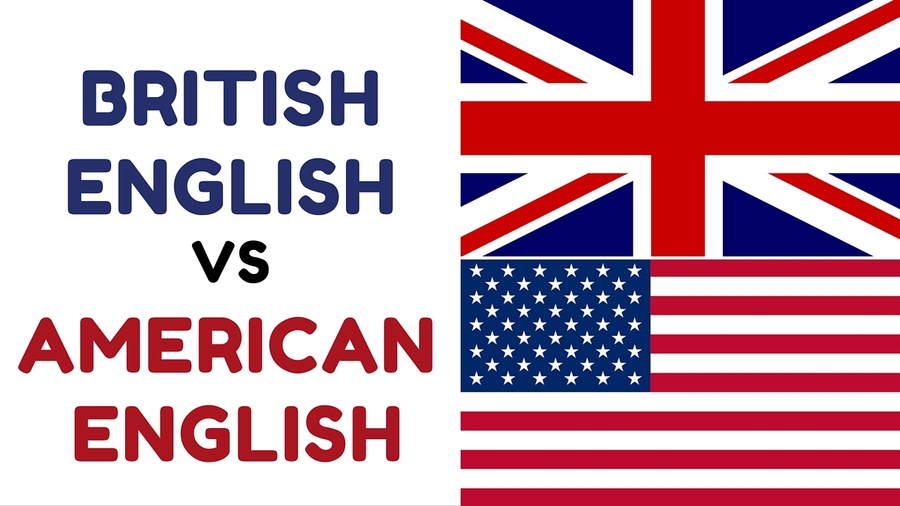Languages are living things: they change and grow over time. As they spread from place to place, you begin to see variations among regional groups. Let’s examine some of the distinctions in the language of British and American.
Spelling

Certain words end with -or in American English (including color, neighbor, flavor, and behavior), where in British there is an extra u (colour, neighbour, flavour, behaviour, etc.). Also, some words that end in -er in American English, such as theater, meter, and center, are spelled with an -re in British English (theatre, metre, centre). These rules are not universal; for example, the words tailor and quarter are spelled the same in both British and American English.
Grammar differences

Prepositions are sometimes used differently in British and American English. For example, British people will ask “Where are you going at the weekend?” and Americans will say “I’m going camping on the weekend.” Similarly, a building in England will be located in a particular street, but in America it is situated on that street. Also: a British person might ask what you are studying at university, while an American will tell you what they are learning in university).
The past tense of some verbs differs between British and American as well. Examples include the words spill, smell, learn, and plead. The past tense forms of these words in British English are spilt, smelt, and learnt, but in American English you say spilled, smelled, and learned.
To get also differs in its past tense and is also used in many ways. In American English it is common to use the word “got” to indicate possession in the present tense, so when you say “You’ve got a bicycle” it means the same thing as “You have a bicycle.” In British English, the same sentence would mean that the person has obtained a bicycle, which in American would be “You’ve gotten a bicycle.” That past participle form of the verb (gotten) is only used in American English.
Vocabulary differences

Many words for common items are also different between these two languages. This can be confusing for people who learn English in one region and then encounter people or books from the other region using words that they don’t recognize. Here are some common ones:
Food
In the UK, if you ask for a biscuit, you’ll get a sweet delicacy called a cookie in the US. In British English, crisps are thinly sliced fried potatoes that come in a bag and are called chips in America, but British chips are what Americans call fries. British children love to eat sweets while their American friends like candy. If you want to eat your vegetables, be aware that the big purple thing is aubergine in the UK but eggplant in the US, while British courgette is just like American zucchini.
Transportation
Parts of a car are known by different names in British and American English, such as bonnet and hood or boot and trunk. Petrol in British is gas in American. A car park in England is a parking lot in America, a pavement is a sidewalk, a zebra crossing is a crosswalk, and a motorway is a highway. You’ll also walk down the High Street in England but down Main Street in America.
Clothing
Don’t tell a British person you like their pants – they’ll think you mean their underpants. Tell them you admire their trousers instead. Similarly, never tell a woman wearing capri pants that her knickers are lovely, as that is the British word for panties. You might also be confused by someone who says they are wearing a jumper when it’s actually a sweater (or vice versa). If you’re going for a run you’ll wear trainers in the UK and sneakers or running shoes in the US.
Life and leisure
Do you live in a flat? No, it’s an apartment if you’re American. Football is the British word for what Americans call soccer, and you’ll visit a cinema in Britain but go to a movie theatre in the USA. If you need to relieve yourself, you’ll ask for the toilet or the loo in Britain, but the bathroom or restroom in the US. Once you’ve washed your hands, put your garbage in the trash can or your rubbish in the dustbin. Should the lights go out, you might use a torch (in Britain) or a flashlight (in America) to find your way through the dark.
That’s the end of our article about British English vs. American English, so at the end of this sentence, I’ll use a period (in American) or a full stop (in British). No matter where you live and which form of English you’ve begun learning, a native English teacher can help you improve your conversational skills! Our Discord server has both American and British Native English teachers available for practice in classes.

